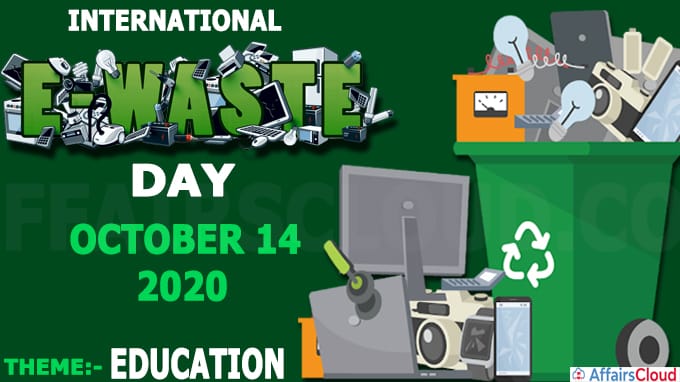 The Third International E-Waste Day was observed on 14th October, 2020. The day is observed to raise awareness about e-waste recycling and encourage consumers to recycle e-waste. It aims to sensitise the youth on E-waste.It is annually observed on 14th October.
The Third International E-Waste Day was observed on 14th October, 2020. The day is observed to raise awareness about e-waste recycling and encourage consumers to recycle e-waste. It aims to sensitise the youth on E-waste.It is annually observed on 14th October.
i.International E-Waste Day has been observed since 2018 by WEEE (Waste Electrical & Electronic Equipment) Forum.
ii.International E-Waste Day 2020 Theme -Education.
Electronic Waste (E-Waste):
i.E-Waste are Electrical and Electronic Equipments (EEE) which have been discarded by consumers with no intent of re-use.
ii.Some of the common e-waste are Televisions, Laptops, Mobile goods, Washing Machines etc
Key Points:
i.According to the UN’s (United Nations) Global E-Waste Monitor 2020 about 53.6 Million Metric Tonnes (Mt) of e-waste was generated worldwide in 2019. Only 17.4 Percent of e-wastes in 2019 were collected and recycled.
ii.The report also estimates that by 2030, 74 Mt of e-wastes will be generated.
iii.in last five years, the volume of E-waste increased by 21 per cent globally. It has a doubling rate of 16 years.
Reasons for high levels of e-waste:
i.The increase in production of EEE equipment has been attributed to Industrialization, Urbanisation and also high levels of disposable income. It is also due to irresponsible consumptions, shorter life spans of products planned by the producers of EEE.
ii.As of 2019, only 78 countries had sound policy for management of E-waste.
India & E-waste:
i.India has generated 3.2 Million Tonnes of E-Waste in 2019.
ii.According to the Central Pollution Control Board (CPCB), India has 312 registered E-waste recyclers. They have the capacity to handle 782, 080.62 tonnes of E-waste each year.
iii.In 2016, the Ministry of Environment, Forest and Climate Change (MoEFCC) notified the E-Waste Management Rules, 2016.
iv.The E-waste (Management) Rules enforces Extended Producer Responsibility (EPR).
v.According to EPR, the producers will be responsible for a certain percentage of E-waste generated from their goods once the products have reached the “end-of-life”.
About WEEE (Waste Electrical & Electronic Equipment):
President of WEEE forum– Jan Vlak
Headquarters – Brussels (Belgium)




